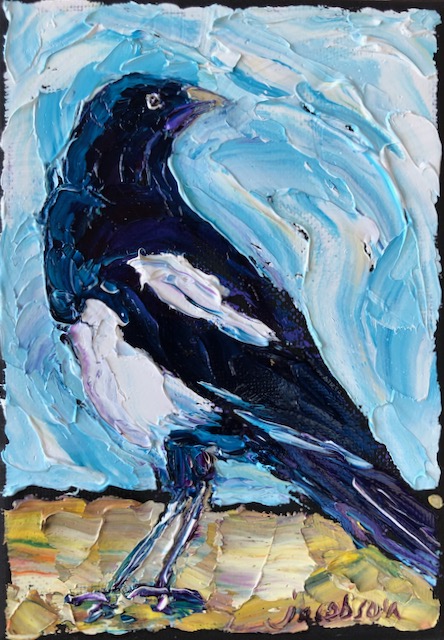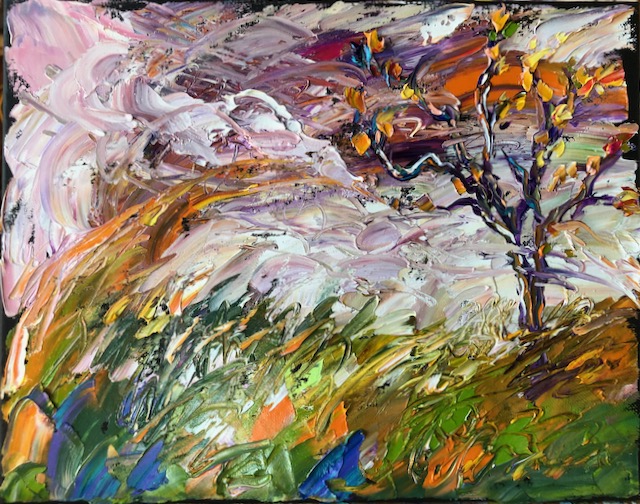Pachyderm / Oil on black canvas / 5x7 / $68, including shipping
sold
THERE'S A WONDERFUL BOOK called "The Artist's Way," by Julia Cameron that I encourage you to read, even if you're not an "artist" in the traditional sense of the word.
While the book is about finding, feeding and encouraging your inner artist, it's really about finding, feeding and encouraging your soul - the creative drive that is in all of us.
It might come out in baking or cooking, it might come out in the way you decorate and keep your home. Your creative soul might be in your garden, or in your appreciation of poetry, or in your relationships with your family or your pets or the night sky.
The book is intended as a 12-week course to help people get unstuck, or unblocked, or find the courage to take the next creative step. These are not issues for me, but the book has been immensely helpful anyways.
Its main idea and task is to write "morning pages." That is, get up every morning and write three longhand pages, about anything. Even if you have nothing to say, and you write, for three pages "I have nothing to say," the point is to do it. Write your day's plans, your shopping list, the movies you want to watch, the friends you miss, and see, even there, I've slipped from the mundane into the more heartfelt. So, watch for that to happen - and it will.
The point of the morning pages is to get the crap out of the way. Writing about the stuff that worries you, or the stuff that you're not even aware is worrying you, well, it takes that stuff out of the way. It could be something as simple as you needing to remember to have the car inspected - write it down in the morning pages, and you won't find yourself reminding yourself about it 20 times an hour. Think that repeated reminding gets in the way of creativity? You bet it does.
Since I started writing morning pages years ago, my creativity has blossomed, my vision has sharpened, and the creative force in me has grown stronger and stronger.
And you don't show these to anyone. No one. You don't even have to go back and read them. The content is not the point, nor is the style, the word choice, the spelling, the grammar, the handwriting, none of that. It's the transfer of stuff from your head to the page. The emptying of the critic brain to free the creative brain. That's where the magic is.
I hope that some of you will try this, especially in this time of solitary existence and isolation. Who knows what you might find?
Next time, I'll share an interesting exercise from the book.
***
The Woody Show
I MIGHT HAVE WRITTEN about this already, but it continues to amuse me, so I will post it again. Woody, who is about 15, and mostly blind and deaf, moves his bed several times a day, by scratching and scratching with his forepaws while backing up. The other night, in my bedroom, he moved his little bed from the doorway (where he'd put it earlier) all the way across the 5x8 rug, and then along the wood floor at the foot of my bed to the side where I sleep.
I think his point in all of this is to place his bed in spots that the other dogs and I have to pass, or step over, when we enter or leave the room. Since he can't hear or see very well, I think he relies on feeling the vibrations from our footsteps, to know that we're leaving. And leaving the bedroom - or the living room, for that matter - means it's time to go out, or to have a meal, both of which are big events in the life of the house here at 18 Bayview.
***
Coda
"Experience, even for a painter, is not entirely visual."
- Walter Meigs




